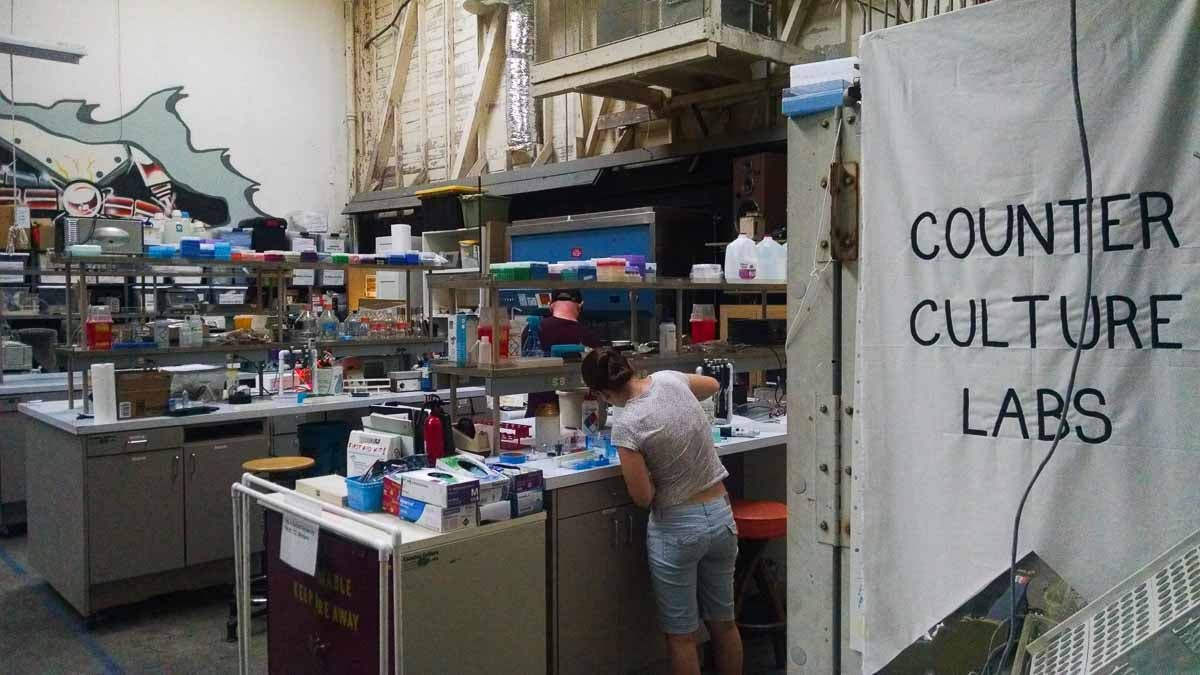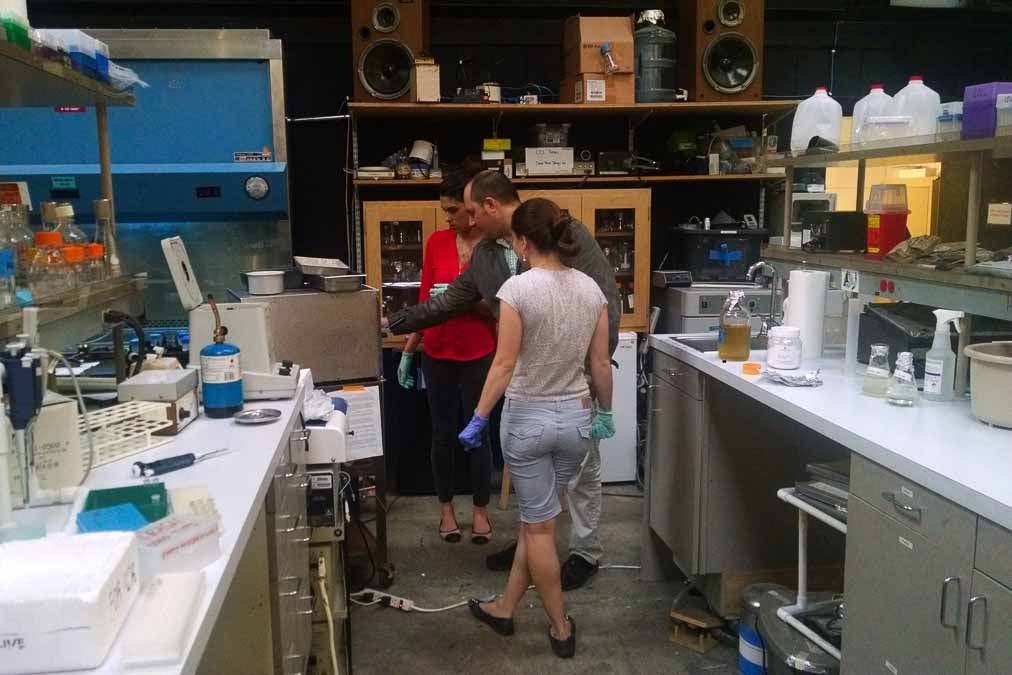Ragtag group of non-scientists tries to break up monopoly on insulin
Listen
Counter Culture Labs looks like what would happen if your high school science and art classes were held together in the same space. (Andrew Stelzer/for WHYY)
Tired of paying too much for common prescription drugs? Ever wish you could just head into the kitchen and make medicine yourself?
A group of bio-hackers in Oakland have decided that even though they’re not trained chemists, they want to try and disrupt the big pharma monopoly by home brewing insulin, a crucial medicine for millions of Type 1 diabetics all over the globe.
The lab
Counter Culture Labs looks like what would happen if your high school science and art classes were held together in the same space. It’s colorful and chaotic, with flyers on the walls, and a pounding noise coming through the ceiling from a dance class upstairs.
Funded in part by a kickstarter campaign, it’s an all-volunteer bio-hacking lab in Oakland, California. (Bio-hacking is an evolving term roughly meaning citizen-science–people doing research and experiments on their own, not usually affiliated with a university or corporation). At this lab, anyone can walk in off the street and get involved in projects.
“If you’re interested and you’re willing to do something…we are welcoming to people,” says Tamari Kirtadze, who today is helping extract DNA from mushrooms.
“I’ve seen other hacker spaces where they require you to take certain classes before they allow you to do anything,” she adds.
‘Open Insulin’
Today’s projects include a group trying to engineer vegan cheese, a fermentation workshop, and the weekly meeting of the Open Insulin Project, led by Anthony DiFranco.
Along with a group of volunteers, DiFranco is shining an ultraviolet light onto a petri dish. If they see a green fluorescent glow, it’s a protein, and it could be attached to an insulin precursor.
“There’ve been a couple occasions where I thought I’ve seen some very faint glow,” says DiFranco, who has Type 1 Diabetes himself. “But you know, that isn’t anywhere near a conclusive result.”
That glow–if they see it–is just one step in a long and improbable process. The idea is to modify the human insulin gene, shortening the complicated middle part—also called the c-chain—which would make it easier to make what’s known as proinsulin. Proinsulin is a substance produced by the pancreas that helps most of us produce insulin. But Type 1 diabetics don’t make enough of it.
If DiFranco and his fellow researchers could nail down the recipe for producing proinsulin, it would then be shared online (everything here is open source) in hopes that one or more drug manufacturers would run with it, and eventually bring a cheaper version of insulin to market.
So why go through all this trouble? DiFranco says it’s a matter of life or death.
“Personally, I have access to insulin right now because I live in a developed country and I’m in a decent financial position,” he says. “If a generic could be brought to market, and if production could be started…then that could save millions of lives and save millions of people from the complications of diabetes, which are quite grim and severe.”

Anthony DiFranco, middle, working on his Open Insulin project at Counter Culture Labs. (Andrew Stelzer/for WHYY)
A 95-year-old medicine with no generic?
Unlike the medicines used to treat many common ailments, there is no generic insulin available to diabetics. Erin Little, the founder of Sucre Blue, a nonprofit supporting access and affordability for chronic disease treatment, says a big part of the problem is that there are three giant companies: Ely Lilly, Sanofi, and Novo Nordisk, who own the patents to the commonly used forms of insulin —that means no one else is allowed to create it the same way– thus those three corporations dominate the market and control pricing.
“The kind of levels of desperation you see here in the U.S. are quite shocking in the sense that it’s very, very common to use animal insulin,” says Little, who is also a Type 1 diabetic and, at times, has struggled to find affordable insulin herself.
“I’ve also heard really extreme things such as buying insulin off dead people, or kind of going around and finding black market insulin,” Little adds.
Internationally, the situation can be even direr. A 2010 survey by Health Action International found families in many less-developed countries would need to spend a quarter to a half of their monthly income to buy one vial of insulin from a private pharmacy. And in some countries, an adequate supply of insulin simply doesn’t exist, because of both cost and corruption.
It’s all about open science
So could a bunch of ragtag non-scientists in Oakland break big pharma’s monopoly?
Little says theoretically, The Open Insulin Project could disrupt the market by creating a generic that didn’t violate insulin’s corporately owned patents, but there are huge financial and logistical challenges just to get a drug through the FDA’s approval process.
“Within the access to medicine community, people are definitely watching this project,” says Little.
“It would save lives, it would be brilliant, but over the years you do get kind of jaded in the sense where…sometimes it’s better to wait and see what happens than get your hopes up and be disappointed later when it doesn’t happen.”
Counter Culture Labs co-founder Patrik D’haeseleer says the group knows their work will be difficult. But for him it’s not just about the product, but the process of demystifying science.
“For a lot of these projects, if we were to turn them into startups and get a couple million dollars in funding, we could probably achieve our goal much faster. But we really feel that this kind of science needs to be democratized,” says D’haeseleer, who has a computer science and engineering background, but no qualifications related to chemistry or medicine.
“This is going to be what will dominate our lives for the next many decades I think…so we really want to educate as many people as possible to sort of know their way around a wet lab,” D’haeseleer adds.
If everything goes well, the hope is that a new generic form of insulin might only be one or two years away from starting FDA trials, and that in nearby Silicon Valley, there could be some big money investors with an interest in funding medicine that goes against the capitalist grain.
WHYY is your source for fact-based, in-depth journalism and information. As a nonprofit organization, we rely on financial support from readers like you. Please give today.



